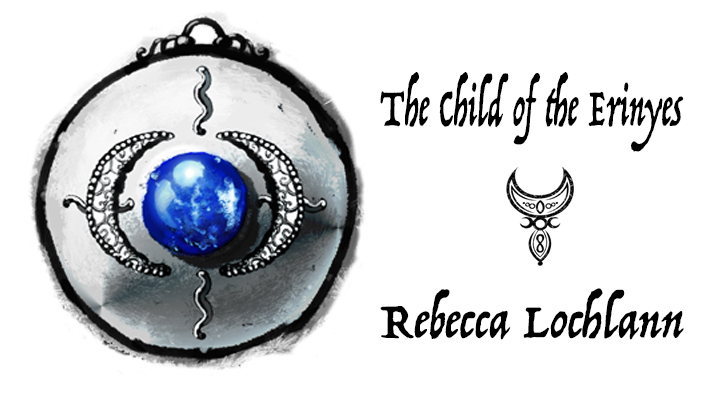A flawed hero: Menoetius
Menoetius
When the Greek youth Menoetius first comes to Crete, he is seventeen, with a young man’s smooth skin and lustrous dark hair that ten-year-old Aridela likens to a waterfall. His eyes are what really capture her imagination, however. Cobalt blue like the heavens at twilight, in this land where nearly everyone’s eyes are brown or black, they have a glow about them, like the sun shining through deep water, or the star Iakchos, rising above Crete’s mountain summits in the fall.
The Goddess lives in his eyes; Aridela, who has communed with this deity from birth, senses it.
Seventeen-year-old Menoetius has an easy smile and affectionate nature. One of the paramount characteristics Aridela loves is his devotion to Potnia Athene, the Mistress of Labyrinthos. The first time this child comes into contact with Menoetius, she is alone, bleeding profusely and near death. He plucks her up from the labyrinth floor and carries her to the courtyard, where she is given over to physicians. If it weren’t for that act, Aridela would surely have died at the age of ten, and there would be no story to tell. As she slides between life and death, she peers up at him, half-conscious, and sees those eyes. She believes Goddess Athene is holding her. Fully trusting, she loses all fear of death in the arms of the Goddess.
Who knows what might have happened if Menoetius had remained on Crete, at Aridela’s side? His instincts tell him to. But, following his father’s orders, he returns to his homeland, and Aridela doesn’t see him again for six long years.
One month after returning to the Greek mainland, Menoetius and his brother are attacked by a lioness. Menoetius survives, but he will never again mesmerize women with his beautiful face. The beast steals something else from him. She extinguishes the singular goddess-light that has always winked and glimmered in his eyes. She leaves little more than scarred flesh over bones. He loses his confidence and devotion. He blames and rejects the Goddess who allowed this to happen. Although he now has her most sacred symbol carved onto his face—the shape of the crescent moon—he believes he is cursed by the Immortal he once adored.
When Menoetius sails to Crete again, he is so changed Aridela doesn’t even recognize him. She unwittingly verifies every bad thing he has come to believe about himself. He retreats further, hiding his pain behind a morose exterior. When she is told who he is, she is nearly as traumatized as if she experienced the attack herself.
Why has Athene done this? Why has she taken a handsome, devout youth who willingly dedicated his life to her, and shoved him into the jaws of an enraged lioness? Why has she made him suffer this way, while leaving his brother, the cynical, arrogant, impious Chrysaleon, whole and unmarred? The reader will soon realize that Menoetius’s wounds go much deeper than any mauling. They wend down into his soul.
The child he once befriended is now the woman he craves, but she is beyond his reach, wholly in love with his shallow, self-absorbed, yet still handsome brother. Menoetius was charged with protecting the sacred child; instead he abandoned her to serve mortal obligations. Now, stripped of all that could have been his, he must watch, torn between loyalty and love as his brother sets out to deceive Aridela and every other Cretan.
Aridela can almost see the inexorable bonds between these two brothers. The invisible rope that binds them is frayed, untwined; neither can sense it, or they have deliberately turned their backs on it. In the way an angry tide strikes at the cliffs, or the sun forces the moon from the sky, these two are uneasy halves of a single whole. She sees this, but doesn’t know how to forge peace between them. Not yet.
Goddess Athene, she who has watched mortals live their lives since the beginning of time and who sees into the future, knows how hard her hand-chosen triad will have to fight. She sends her beloved heroes into the deepest suffering, to the very portal of death, and she leaves them there, to either expire or claw their way to triumph. It’s the only way.
As a woman and an author, I was strongly affected by the Phantom of the Opera story, most notably Susan Kay’s vision in her book, Phantom. The story of Erik, especially how he is born and what he endures as a baby, is unforgettable. Along with other influences, it swayed the way I wanted to tell my story, and Menoetius was the obvious choice to send into a life of struggle, of “what-ifs,” yearning, and remorse.
Eventually, Aridela must grow beyond her immature adoration of physical beauty. If she doesn’t, she will fail in the ultimate goal. She and her countrymen revere beauty in everything. Now here is this conundrum. Once, Menoetius was lively, charming, different from anything she has ever seen. She’s never encountered or even imagined such an agony as this man has suffered in her entire pampered life. It forces her to reexamine everything she has always taken for granted. Can she love something ugly? It’s even a bit worse for both of them, as Menoetius did enjoy seventeen years of unmarred beauty, so there is a thread of regret neither can completely ignore.
Aridela has always been told she is wise and far seeing, insightful and clever. She believes it because this is reflected back at her every day. Athene, who knows what comes, wants her child to understand that what she’s been told is not necessarily the truth. She wants more from all three of her chosen heroes.
I am often struck by how obsessed our own society is with beauty, to the point where women are spending great sums and suffering terrible pain to reconstruct and transform everything they can, often turning themselves into odd-looking almost alien beings in a desperate quest for perfect beauty. Menoetius’s wounds, and the growth Aridela experiences because of them, is a strong underlying theme in the Bronze Age segment of the series—and beyond.
Menoetius’s biggest flaw isn’t the scarring from the attack. It’s that he creates and magnifies his own misery. He assumes he knows what people feel about him, and he pushes everyone away without giving them a chance. Aridela is too young and inexperienced to understand this, so she takes it all very personally. Selene, the Phrygian warrior, is the only one who does understand. She slips through his barriers and begins the healing process—a necessary step to help him dig his way out of his second biggest flaw: the loss of his courage. Somehow, Menoetius’s courage must be reacquired, so that when it comes time, he will know what to do, and he will have the strength to do it.
Divine Athene is patient. She realizes it will take a long time to prepare them. Again and again, she sets these three upon widely diverging paths. She doesn’t guide them: she leaves it up to them to make their own choices. For an Immortal, thousands of years mean nothing.
The only way Menoetius can earn Athene’s forgiveness and put the world to rights is to face the lion. Can he do it? Or will he leave Aridela to whatever fate might come at his brother’s hands? Ah, that is the question, dear reader.










I find Menoetius one of the lovliest heroes I have ever read about. The story of his flaws and terrible punishment at Athene’s hands, of Chrysaleon usurping his rightful place as Aridela’s true love, has tragic grandeur…That’s me not being facetious for once!
Just re-reading this post; I still find it very moving…Love those snowflakes you’ve got on today….
The snowflakes are an annual Google thing! 😀
that image is not your property
No sir, it belongs to the gentleman I credited beneath the photo. I have licensed the use of it. The imprinted term is an attempt to keep unauthorized people from copying and using the image from this page without permission or licensing. I have had that sort of trouble repeatedly, which I why I have resorted to marking some images.